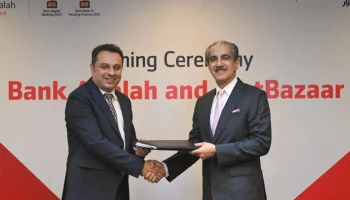
Today’s young people stand at the threshold of transformation, driven by rapid technological advancement and shifting societal values. Armed with unprecedented access to resources, networks, and information, young entrepreneurs are not only launching startups but also tackling critical issues with a global impact, from sustainability to economic inequality, while embedding social good into their business models.
At the School of Tomorrow panel discussion 'From Sparks to Startups: Young Innovators and the Future of Incubation', industry leaders and young entrepreneurs gathered to discuss the power of youth-driven innovation in creating businesses that are both profitable and impactful. Key topics included overcoming funding barriers, balancing profitability with social responsibility, and leveraging mentorship and educational resources to thrive in competitive markets.
Enabling young innovators to disrupt industries
The journey from idea to startup success demands passion, resourcefulness, and support. Today’s young innovators are reshaping sectors from healthcare to green technology by harnessing emerging tools like AI, blockchain, and the Internet of Things (IoT).
However, the panel noted that resources alone are not enough. For an idea to become a valuable product, young entrepreneurs need both technical expertise and strategic thinking. Skills like market research, product development, and customer engagement are crucial. Support systems, particularly incubators and accelerators, provide vital guidance and networking opportunities.
Katalyst Labs founder Jehan Ara highlighted the importance of market research and prototyping: “If you can demonstrate that your idea has a market and that you can develop a working product, funding may become a possibility, even if traditional venture capital is harder to access.” While a robust angel investment culture is lacking in Pakistan, Jehan noted that pioneering investors are starting to back youth-led startups with potential for innovation and social impact.
For Jehan, persistence and the ability to learn quickly are key to entrepreneurial success. “Startups like ‘Connect Here’, created by a 19-year-old, exemplify how innovative ideas can break through when there’s a clear market fit. Today, this app is utilised by major banks across Pakistan because the founder understood both the problem and the solution.”
Challenges in securing early-stage funding
Securing early-stage funding is a major challenge for young Pakistani entrepreneurs, who often lack industry experience and financial track records. The panel explored alternative funding options, such as angel investors, crowdfunding platforms, and youth-focused venture capitalists.
Seed Ventures CEO Shaista Ayesha advised young entrepreneurs to embrace trial and error: “In Pakistan, there isn’t extensive market data or a roadmap for entrepreneurs, so you have to rely on trial and error. Funding might come, but only if you’ve poured yourself into your idea and made it work at a small scale first.”
The panel stressed the importance of mentorship in navigating these challenges. Young founders were encouraged to seek guidance on refining their business plans and connecting with potential investors.
Balancing profitability with social and environmental impact
Today’s young entrepreneurs increasingly view business success as more than profit. Many prioritise sustainability and social responsibility, aiming to address real-world problems while generating revenue. The panel discussed how youth-led startups are embracing the “triple bottom line,” focusing on people, planet, and profit.
The panel highlighted the importance of balancing profit with social and environmental goals. Shaista noted, “It’s crucial to put both your heart and mind into the venture. Youth-led businesses can make a difference when they operate with a clear purpose that goes beyond profit.” Pakistani entrepreneurs are driven to create positive social impact, tackling issues such as sustainability, education, and healthcare access.
Jehan Ara referenced the triple bottom line of people, planet, and profit as a guiding framework for youth-led businesses. Examples of startups that successfully combined social impact with financial gain underscored that responsible entrepreneurship is not only possible but increasingly expected.
Support systems: Mentorship, education, and community
Jazib Zahir, Director of the LUMS Centre for Entrepreneurship, underscored the value of support networks like incubators and accelerators: “At LUMS, we bring in industry leaders and experienced advisors who may not be traditional entrepreneurs themselves but who have valuable insights and resources to share with younger founders. The goal is to help them understand how to navigate the startup landscape and connect with industry.”
Young entrepreneurs benefit from support systems that encourage experimentation and resilience. Educational programmes play a crucial role, offering skills in finance management, marketing, and team-building.
Jazib stressed that mentoring and education are essential pillars of Pakistan’s entrepreneurial ecosystem. “Young entrepreneurs need practical skills in business and financial management, but they also need to learn resilience. Hustling for resources is part of the journey.” He further emphasised the importance of a well-rounded education, stating, “Studying subjects like science or humanities can help young entrepreneurs find patterns and think like problem-solvers, which is critical for innovation.”
Mentorship from industry experts and fellow entrepreneurs provides invaluable guidance, while access to a community of like-minded innovators fosters collaboration and learning. These support systems are essential for young founders navigating the challenges of the startup ecosystem.
In an increasingly interconnected, impact-focused world, young innovators are well-positioned to drive meaningful change. With the right mix of resources, funding, mentorship, and education, they can transform bold ideas into startups that not only disrupt existing industries but also address critical societal issues.
The ;From Sparks to Startups' panel at the School of Tomorrow event highlighted the immense potential and resilience of youth-led entrepreneurship in shaping a sustainable and inclusive future.
















